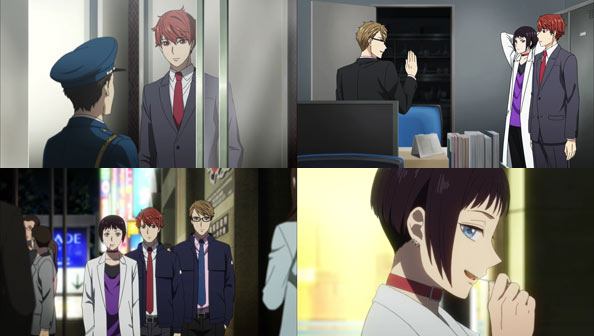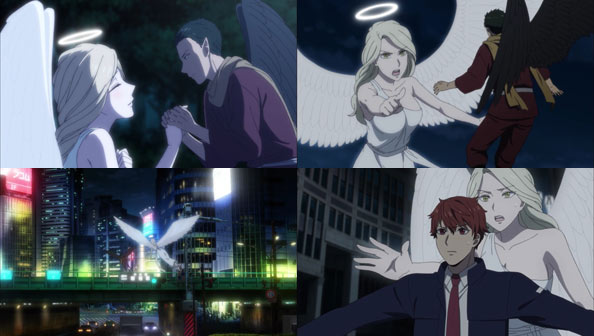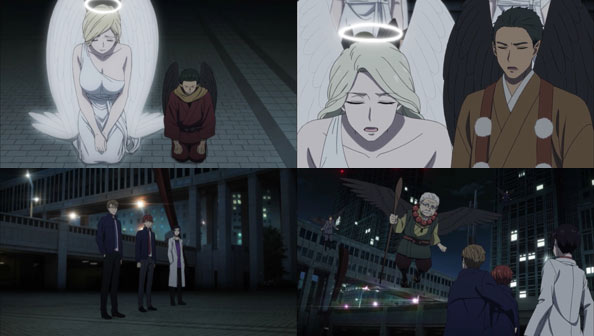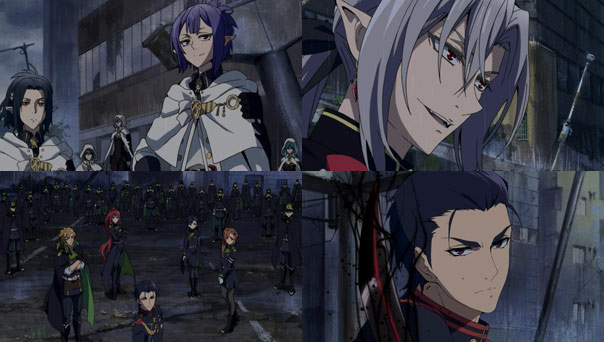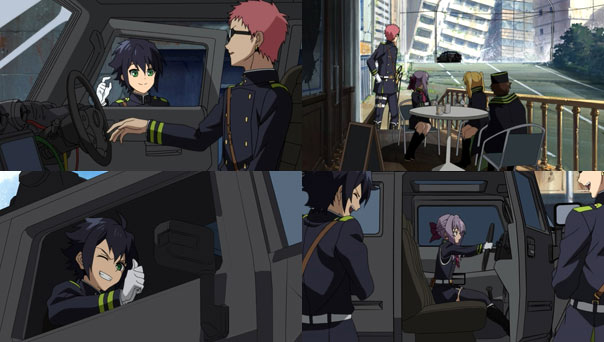We’ve watched the first couple of days of the zombie apocalypse from the POV Akira and the woman in pink (whose name is Shizuku), so it’s good to get an entirely new POV, in this case from the star host Shuu at a gentleman’s club. His latest client is a frightened little girl who has lost everyone and everything, but he promises to keep her safe.
Shuu and his handsome co-workers adopt an entirely different demeanor upon arming themselves, leaving the safety of the club, and setting out into the Shinjuku sun, ready to do battle with the seething hordes of mindless zombies. Akira arrives via motorcycle just as this battle is about to take place.
But let’s back up a few hours, as the show likes to jump back and forward in time. To Akira’s delight, the internet is back, just when he finally has time to reconnect with all of his friends he lost touch with due to his job. He arrives at another solemn moment when he realizes the internet only works because so many fewer people are using it since they’ve been turned.
One man who hasn’t (yet) been turned is his best bud from college and rugby club, Kencho (whose business card reads Ryuuzaki Kenichirou). When shit went down, he just happened to be in the bondage room of a Shinjuku brothel. Thus the woman he was to spend the night with was already tied up when she became a zombie.
He’s been trapped in the room with her for three days with ntohing but water, and he’s starting to fade…until he gets a phone call from an unusually chipper Akira, who asks him to text him where he is and he’ll come for him.

This Akira on the other end of the line is a far cry from the last Akira Kencho saw: they’d gotten drinks about a year ago, and Kencho boasted about how much success he’d had as a big-shot real estate guy. Politician clients, model girlfriends and day-trips to Paris. Akira, at the time, was thoroughly mired and soul-crushed by his job.
At the time, Kencho told him to simply quit that job, since it wasn’t doing him any good. But Akira didn’t want to hear it, not then, not from Kencho. Now, thanks to the distraction of a car horn (which also saves Shou’s life), Akira is able to clear out the brotel and get to Kencho…so he can tearfully apologize to his friend for not taking his advice and quitting a year ago.
Kencho wants to say something too, but the horde returns promptly, forcing them up to the roof of the building. The door barricade won’t last, and the only thing to do is jump, which is actually not that crazy an idea in such a built-up, skyscraper-packed district. With the same conviction as he risked his life to buy beer and save his friend, Akira leaps and lands hard but safe on the roof across the street.
Kencho is astounded, but after a beat, he laments that he won’t be able to make that same jump. Instead, he decides to tell Akira the truth: he hated his job too. He had a knack for it due to his gift of gab and talent for schmoozing, but hated constantly lying, manipulating clients into signing bad deals, and maintaining the fiction of the ideal happy life.

He’s sorry to Akira for showing off when they last met, but Akira already knows Kencho went above and beyond to entertain him and their friends at school and on the rugby team. Kencho admits, loudly and tearfully, that what he really wanted was to be a stand-up comic. Akira tells him again to let go of his dour fake real estate job and leap to the rooftop where he is.
Suddenly suffused with confidence (or maybe just reckless abandon), Kencho listens to his friend and jumps—tossing off all his clothes in the process. Akira laughs harder than he has in years at the muscular naked spectacle, but is still able to grab Kencho when he comes up a bit short and lift him up to safety.
I cannot say how Kencho got his clothes back, but both he and Akira have a naked beer session in front of a fire on the rooftop as the sun goes down. Kencho admires Akira quitting his job, dropping everything, and moving on with his life, even as he’s doing the exact same thing simply due to the zombie apocalypse.
Still, it happened, and Kencho believes true success comes from escaping dead-end situations that cause apathy and despair. Akira and Kencho are now free from the jobs they hated, and free to define themselves how they see fit. Akira also gets to cross off another item on his list: Drink and laugh with my best bud.
This was a beautiful portrait of positive male friendship and love. If the ED ever becomes a reality and they’re joined by Shizuku and “Samurai Girl” in a survivor’s quartet, they’ll surely have to wear more clothes. But this was an exceedingly uplifting reunion.
Like Shuu’s struggle to keep one little girl safe at the club showed, nothing is over in this ruined world until it’s over. There’s still hope, as long as non-zombified humans can still breathe, drink, eat, love, and laugh together.


























